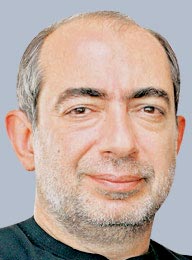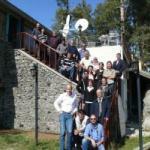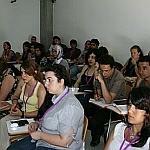IPS Training for Young Journalists
"From the Classroom to the News Room"
Twenty young news and communications students joined the programme "From the Classroom to the News Room", organised by the IPS Communications Foundation.
On the first day (2 September), they met with journalist Umur Talu, Assistant Professor Sevda Alankus from the Eastern Mediterranean University and lawyer Rana Yilmaz at the campus of Bilgi University, Istanbul.
The participants felt that what they learned on the first day had added to their knowledge and that it had been useful to meet professionals from the media sector.
A topic which interested them very much was the rights and responsibilities which each journalist has as an employee.
"Women in the majority for the first time"
Nadire Mater, the president of IPS Communications Foundation, informed the young trainees on the programme which is running in its third year, and also talked about a new project of the Independent Communication Network (BIA) called "Journalism for Rights, Freedom for Journalists". She expressed her excitement at the IPS programme, saying:
"This is the first time that there is a majority of women at this kind of meeting. And for the first time we are together with newly-graduated students."
Talu: Voices of suffering people
Talu, a journalist for the "Sabah" newspaper, summarised changes that have taken place in journalism. According to him, journalism is relatively more free and reporters adhere to ethical codes more strictly. He also spoke of a faster, but less critical environment in journalism and asked: "When we are free, are we really free?"
He argued that what was being experienced at the moment was not freedom but ease, and added: "You can use your conscience, your brains, your power to struggle and your independence in order to be free."
According to Talu, the senior management of newspapers was far detached from the people's life styles and rights. However, it was possible and important to give space to the voices of those who were suffering. He emphasised that the Internet provided journalists with both commercial and professional opportunities.
For Talu, journalism is "the effort to understand those unlike oneself", arguing that it could only be meaningful with such empathy.
Capitalist investment in the media
He summarised the effects that capitalist investments in the media have had on journalism:
"In the media, structures, speed and money are increasing. Aydin Dogan bought "Hürriyet" newspaper for 90 million dollars. Today "Sabah" newspaper and atv channel are valued at 200 million dollars. When you understand this increase in value, then you also understand its journalism."
"These days, the finance company Merrill Lynch is trying to buy "Sabah". What it is concerned with is not journalism, but the size of the market."
A search for a new kind of journalism
Assistant Professor Alankus spoke about a search for a new kind of journalism in order to behave ethically and politically responsible. She outlined the concepts of "rights journalism", "citizenship journalism" and "peace journalism".
Giving examples of the media's violations of women's rights, she described how the mainstream media behaved towards the "other", and how language and discourse prevented weak or discrimated groups from using their rights of communication.
She emphasised that this silencing deprived those who were discriminated against of reading and hearing of the experiences of others in similar situations, thus further silencing and weakening them. She also gave examples of the sexist and discriminatory language used in the mainstream media.
Speaking about peace journalism, Alankus drew attention to the fact that conflict always makes the news, while peace does not, but that peace journalism could be translated into daily life. She also spoke about news sources, objectivity, discourse and language and the elements of a true news item.
Yilmaz: Know your rights
Lawyer Rana Yilmaz drew attention to the employment situation of journalists. She summarised the labour rights of journalists, from service contracts to wages, from compensation to yearly holidays, from overtime to trade union rights.
She reminded the young graduates of the importance of the trade union struggle:
"Speak of injustices that you experience at every opportunity. If we do not act together, then our rights will always be taken away again".
The journalism candidates gave examples of their own experiences of rights violations during their own placements; using concrete examples, they asked many questions.
The first day was attended by: Çağla Agrigöl (Agos Newspaper), Tülin Sepetci (Mediterranean University), Persude Erdem (Ankara University), Feyza Yavuzer (Atatürk University), Kemal Hoca (East Mediterranean University), Özge Erbalaban (Ege University), Selma Kara (Erciyes University), Güllüsah Sürekli (Fırat University), Müge Celebi (Galatasaray University), Yasemin Aksit (Gazi University), Berktan Kuru (Ist. Ticaret University), Burcu Bayir (Kocaeli University), Gizem Karakis (Lefke Avr. University), Utku Ceylan (Maltepe University), Rasul Usenaliyev (Manas University), Erhan Kilic (Selçuk University), Yıldız Türk (Yeditepe University) (TK/AG)
KURDISH QUESTION
PKK Ceasefire to be Terminated on 31 October?

KCK CASE
Court Dismissed Request for Defence in Kurdish

7th Istanbul Gathering for Freedom of Thought

CONSTITUTIONAL AMENDMENTS
58 Percent Said "Yes" to Constitutional Reform Package

Rights Organizations 3 Years ahead of Foreign Minister









